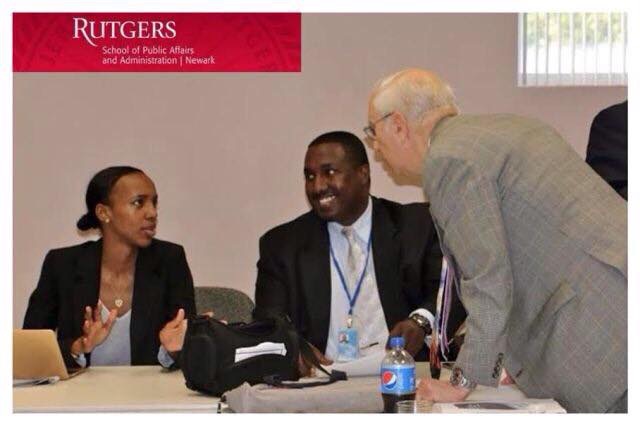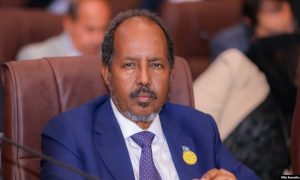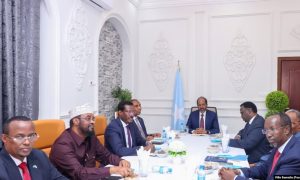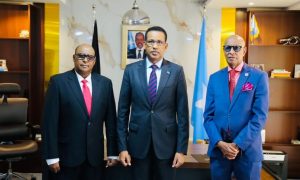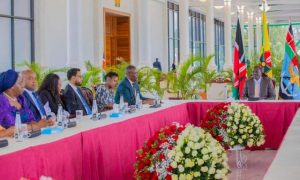
New York | September 16, 2015 | Mr. Awale Ali Kullane:- Ambassador and Deputy Permanent Representative Permanent Mission of the F. R. of Somalia to the United Nations in New York.
The Annual Conference on Media & Democratic Governance hosted at Rutgers University School of Public Affairs (SPAA).
Before I engage in the issue of “How the World Media Covers Somalia” I want to start with a hypothetical: Imagine a reporter just arrived from a renowned Global media outlet from outside the United States comes to America for the purpose of doing a single report about the USA and recent incidents in the country; imagine this reporter represents a global audience curios about the United States; imagine this reporter is the only reporter from said global media outlet visiting the USA, and this news report will be witnessed by potential investors, tourists, students, and others that the U.S needs to influence. Also for this hypothetical, let us assume that this is the only report that will appear in the global news for weeks maybe months to come, and this report and many of these kind will be covering and be branding the United States of America for the coming decades. The report will appear in all major global news-papers and this will be how many will describe the country to the entire world, a world willing to learn more. Imagine the reporter now just makes this short hypothetical report about the USA,:
“As a nation of constant shootings, and violence demonstrations, race riots. Recently in the united Stated there has been brutal police shootings in Texas and in Illinois, as well as the violent shootings of two Virginia reporters, killed on air just a few weeks back. And A month ago, members of the US military where targeted in Tennessee. Movie-goers where Killed in a Louisiana movie-Theater, and of course in June, nine people were killed in a mass shooting at Emanuel African Methodist Episcopal Church in Charleston, S.C. and many of the US cities are seeing an increased level of violence”, and then the reporter, appearing before the camera wearing a khaki shirt and a bullet proof vest, says, “reporting from the USA”.
Of course, no American would refute the reality of the stories, but no American or informed non-American would allow such incidents to define the United States. Because America is more than such individual, specific incidents. Countries like the US are and must be defined by many other factors: innovation, advances, hospitality, art, diversity, culture, history, society, and so on.
However, narrow reporting by many global media outlets about Somalia have branded the nation by its challenges and obstacles alone. As a result, it falls to the Somali people and its Government to challenge the validity of such reporting and demonstrate that such reports should not be interpreted as truth.
Our knowledge about the world is mainly informed by what we have learned through the media. But just how objective and informed are the journalists who inform our knowledge and perception of the world? Could we be subject to biased and misinformed reporting? while news networks play a major role in shaping our view of the world, their coverage of international news is wanting. News networks have significantly reduced their foreign bureaus, especially in the developing world. Since it is cheaper and improves rating to cover local news, only a small percentage of news coverage is dedicated to international news. Online news sites are no better in their coverage of world news. The same news covered by news networks is replicated on online news sites. Local media, online news sites, even CNN mainly recycle international news from Reuters and AP Wire services (Miller).
The change in the economic structure of the news industry in the age of cost savings and budget cuts has led to the perception of investing in international news as a costly and risky strategy. Western media are the most affected by this problem and have seen a significant decline in international correspondents. The decline of foreign reporting has not only been witnessed in television reporting, but also on the print media. The circulation of paid newspapers has declined due to the rise of free, mostly online publications. Unfortunately, free publications offer less news and mainly rely on non-original reportage and worse blogging, as opposed to paid newspapers. It is thus hard to verify the authenticity of news being reported. Erroneous reporting by one news network regularly translates into misinformed perceptions by a wide audience.
The narrow reporting of international news has led to a stereotypical approach to foreign affairs. Today, news networks are less interested in reporting actual facts about international affairs. On the contrary, they tend to dwell more on past perceptions and notions of foreign countries that are exciting, draw attention to the news report, and improve ratings. As reported by Dr Roman Gerodimos, the narrow reportage of foreign news by the international media has led to a significant decline of new factual reporting of the developing world.
Somalia is arguably one of the world’s worst victims of such biased and misinformed reporting about the developing world. A simple search of Somalia on Google News reveals more negative aspects of the country than positive ones. Like other nations around the world, Somalia has its problems; like other countries, Somalia does not claim perfection. But again, it is unfair to define a country by only its challenges and problems.
Somalia has for a long time been considered the most failed state in the world. This has been for a good reason. Since the Somali government’s collapse in 1991, the country became a byword for chaos. The once vibrant Mogadishu – the country’s capital city by the seaside – became home to civil war followed by Al-Shabaab, an Islamic terror group. What remained of the city were houses and shops pocked with bullet holes, and bombed-out facades of buildings. In two decades, civil war and anarchy ensued in the country. But this is all in the past. Somalia has made important strides in the recovery process, none of which has been reported by media outlets.
Terror still exists as a major challenge in the country. But the resilience and fighting spirit of Somalia and its people has ensured that progress is still made amidst these challenges. A historic achievement in Somalia was the coming to power of a permanent federal government in 2012, after two decades of lawlessness. The country’s capital is no longer controlled by the Islamic militia group. Al-Shabaab is no longer a standing army and not an existential threat to Somalia. While Although terror attacks focused on public hotels and soft targets still occur, the power of the militia group has been reduced significantly. In fact, the country is gearing up for a democratic process to facilitate democratic elections and the federal government has regained direct control of over 80% of the country. Have you heard that on MSNBC, CNN, or Fox News?
During his keynote speech at HLPF Copenhagen, President Hassan Sheikh Mohamud recognized 2012 as the year that marked the start of a period of pursuing stability, peace and prosperity for all Somalis. The era of Al-Shabaab and militia group dominance that had crippled the social and economic progress of Somalia had been brought to an end. At some point, the path to unification was unclear, and Somalia appeared as though it had been doomed to fail. In the two years following the establishment of the federal government, a foundation for stabilization and ensuring reform had been built in the country. The New Deal Somali Compact that was endorsed in Brussels in 2013 had guided the process.
Somalia has turned on a new leaf. As early as 2013, Somalis who had fled the country to live in other lands were returning in large numbers. Contrary to the popular reporting of the global media of Somalia as the most dangerous and inhabitable place in the world, Somalia now offers hope. Visit Somalia and you will change your outlook of the country. Today we have daily international flights to Istanbul, Dubai, Nairobi & Djibouti and numerous private run chartered flights within the country. Somalia’s global diaspora is now returning to the country despite having been settled in foreign lands for over a decade. Now they are coming back to their homeland to share their expertise in rebuilding the nation. A good example worth mentioning are Twitter, Istagram and youtube accounts established by some diaspora youth that focus on visible changes in the country and share with their peers, however this doesn’t reach the international media.
Today, Somalia presents lots of opportunities to those returning from abroad and even to foreigners. Immediately after the new federal government was formed, Mogadishu was declared ‘open for business’. The years that the country has been governed by Al-Shabaab and other militia groups led to a non-existent education system and poorly developed infrastructure. Those who have been abroad are presented with numerous opportunities to apply their expertise in development, business, governance, healthcare, and other issues. The return of the diaspora has also translated to a re-launch of Mogadishu’s construction. The shops that have for a long time been shelled-out facades are now functioning businesses. There is hope that that the country will regain its economic and political stability.
As a country, we have made noteworthy strides in building regional administrations. Our success has largely been enabled by the determination of the people of Somalia, the sacrifice daily made by the Somali forces with the help of the African Union Mission in Somalia (AMISOM), the international community, the United Nations (UN) – which have been instrumental in this progress – and the United States whose government and people have sacrificed much for the Somali people.
We acknowledge that as a country, Somalia is faced with some challenges and problems. Prior to 2012, Somalia was a country dominated by terror groups and militia. While our problems may appear direr than those of other countries, we have done our part to address them since the establishment of a federal government. We are working very hard to realize and revive Somalia as a peaceful country as it used to be decades ago, and we are getting there. The strides that have been made in collaboration with our regional and international partners have set the groundwork for achieving progress and stability. This should hit the headlines and it never appears.
To continue the right path of attaining positive outcomes, we understand that the contribution of the international community is paramount. The development of the country will require investments from foreigners and multinational corporations. Further, Somalia must be recognized as the new business hub of East Africa. We need to expand our business territory far and wide. Unfortunately, our efforts cannot bear fruit if our targeted audience is constantly bombarded with misinformation about who we are as a country.
How the Global media Covers Somalia will play a key role in determining Somalia’s future. While it would be unfair to ask the media to restrain reporting about the problems and challenges facing our country, it is equally fair to expect that they pay equal attention to the progress that Somalia has made as a nation. Amidst all the challenges lie hope, resilience, and the promise of a better Somalia. How people perceive Somalia will largely depend on what the media reports. Reporting only the challenges and problems only frustrates the efforts made by the Somali government and its people. That way, you will have aided the triumph of the Al-Shabaab and other militia groups who have just been
Ethical conduct must be observed in reporting, as the media forms a major tool for shaping public opinion. In the case of Somalia, the picture that the media paints of a country will determine its success in reintegrating itself into the international community. Besides, the involvement of foreigners in restoring peace and stability will depend on their perceptions of the country. The stability of the country and livelihoods of its residents are dependent on the perception the global audience has of the country.
Somalia is inhabited by around 10 million people, many of who still live in difficult conditions. About 3.2 million require humanitarian assistance due to also drought repeatedly occurring in the horn of Africa. A high number of the population residing in rural do not have access to basic amenities such as electricity and clean water. The education system and infrastructural development in the country is recovering gradually. These people already have their fair share of problems. Giving distorted information about the country will only serve to make them loose hope in the slow but progressing change taking place.
As we do our part to advance peace and development in Somalia, we count on the international community’s support and assistance. We will continue to ensure that we do our part to do everything necessary to make the transition from failed state to functional state to full and integrated member of the community of peaceful nations. And we will count on your support in achieving a better living for people of Somalia and the generations to come.
I can guarantee you that we shall not quit fighting for what we believe in. The negative effect of war and instability is not lost on us. We shall strengthen our foundation and create a positive future by eliminating the negative aspects of our community.
The media is a crucial and critical member. We expect that the media to become part of the agent of change for peace in post-conflict settings, through reporting the progress we have made, the challenges we have overcome, rather than where we used to be. Finally we would work on creating such platforms where governance and media work is promoted to deliver peace.
.
Thank you.
_____________________________
_____________________________________________________________________________________
Xafiiska Wararka Qaranimo Online | Mogadishu, Somalia
_____________________________________________________________________________________Advertisement
_____________________________________________________________________________________


